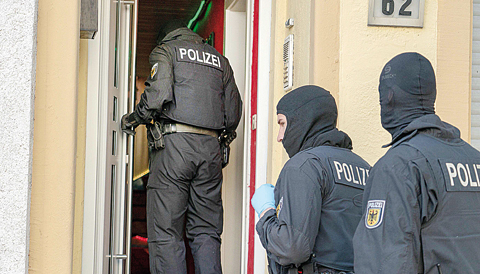 RASTATT: Federal police officers raid a brothel in a red-light district of Rastatt, southern Germany yesterday. The raid was part of a major action against organized crime such as human trafficking and exploitation of sex workers across the country. —AFP
RASTATT: Federal police officers raid a brothel in a red-light district of Rastatt, southern Germany yesterday. The raid was part of a major action against organized crime such as human trafficking and exploitation of sex workers across the country. —AFPBERLIN: German federal police said they carried out the biggest raids in their history yesterday against an alleged organized crime ring suspected of trafficking hundreds of women and transsexuals from Thailand for prostitution. The federal police force said in a statement that a record 1,500 officers swooped on more than 60 brothels and flats in 12 of Germany's 16 states. Prosecutors have 56 suspects in their sights, 41 of them women.
Authorities say a "core group" of 17 suspects "smuggled Thai women and transsexuals into Germany with fraudulent" visas for the passport-free Schengen zone. Those brought to Germany "had to hand over 100 percent of their wages to the operators of the respective 'massage parlors' to pay off their smuggling fee", an extortionate sum of between 16,000 and 36,000 euros ($20,000-45,000).
Seven of the accused, including a 59-year-old Thai woman and her 62-year-old German partner, were taken into custody on outstanding arrest warrants. Beyond human trafficking, forced prostitution, procurement and embezzlement of wages, the ringleaders also face charges of tax evasion, a spokesman for the Frankfurt prosecutor's office, Alexander Badle, told reporters. Some of the suspects could face up to 15 years in prison. Prosecutors in Frankfurt, who have been working with police on the case since February 2017, estimate that the ring drew more than one million euros in income.
Transsexual prostitutes
Interior Minister Horst Seehofer praised the operation as an "unprecedented strike against a national organized crime network". "Several hundred women and men were at the mercy of the inhumane, boundless greed of human smugglers for years and across borders," he said. "This unscrupulous behavior and the sexual exploitation on an abominable scale were put to an end today." Badle said the ring had "specialized" in a niche for transsexual prostitutes in Germany's vast sex industry. He said that while the Thai victims were aware that they were being taken to German brothels, they were duped about the "conditions, including the fact that they would receive virtually no remuneration".
They were brought to Europe on tourist visas that explicitly prohibited work, and spoke no German, leaving them particularly vulnerable to exploitation, Badle added. He said immigration authorities would now examine the victims' legal status to determine how long they could stay in Germany. Prostitution is legal in Germany but heavily regulated and taxed. However a 2002 law intended to improve the legal footing for sex workers has failed to stamp out mass-scale trafficking.
Thailand has a famously permissive attitude toward the so-called third sex people or "ladyboys", but its laws still refuse to recognize their sexual identity, rooting discrimination in the bureaucracy. Sex work, drugs and stigma combine with a lack of healthcare to push many of the country's estimated 180,000 third sex people to the "social, economic and legal" margins", a 2012 study by the United Nations Development Program found. It said HIV prevalence rates among transgender people across the Asia-Pacific region could be as high as 49 percent-a rate that "far exceeds (that of) the general population".- AFP










